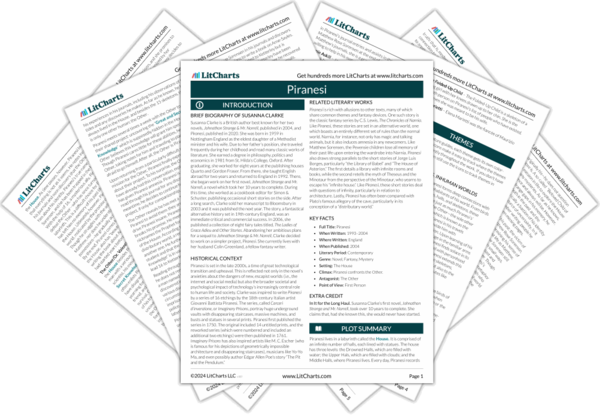In the novel, Piranesi forms deep connections with the non-human inhabitants of his world. From birds and tides to statues, halls, and skeletons, these entities, both living and dead, are just as much Piranesi’s’ friends, allies, and confidants as the Other—the sole other human inhabitant in the labyrinth, which is known as the House. These beings not only aid Piranesi in his travels throughout the labyrinth, but also provide him with companionship and emotional connection. Upon learning of his amnesia, for instance, Piranesi seeks refuge in the familiar arms of the Faun statue. Through troubled, Piranesi finds solace in its presence; to him, the statue is just as imbued with personhood and is just as a human as he or the Other. Piranesi extends this inclusive vision of “personhood” not only to the skeletons, whom he regularly feeds and converses with, but also to the House itself, to which he attributes human attributes like “kindness” and “beauty.”
Piranesi’s relationship with world transcends mere anthropomorphism, however. His relationship with the birds of the House, for instance, reaps real-world benefits, like when they use coded messages warn him of an incoming storm or the Other’s betrayal. In short, Piranesi exemplifies the kind of relationship which the house’s discoverer, the professor Arne-Sayles, suggests “Ancient Man” shared with the world around him: his “dialogue” with nature does not “simply happen in his head,” but in the “real world.” Though Piranesi’s abilities vanish upon exiting the House, he does not entirely forget them, and it changes the way he interacts with the world around him. Unlike his contemporary modern humans or his past self, Matthew Sorensen, he sees little value in money or material things and finds the busy, transactional nature of modern life wearisome. Ironically, then, Piranesi’s stint in the labyrinth allows him to achieve what Arne-Sayles always sought: the wisdom of the ancients. While his theories may not be legitimate outside the novel, the novel seems to suggest that they contain a kernel of truth: that is, modern humanity has lost a priceless means of connection to the wider world, but one does not need to travel to another world to recover it. Humans need only remember that they, like Piranesi, are an Inhabitant of the world.
Human vs. Inhuman Worlds ThemeTracker

Human vs. Inhuman Worlds Quotes in Piranesi
The Beauty of the House is immeasurable; its Kindness infinite.
In all of these places I have stood in Doorways and looked ahead. I have never seen any indication that the World was coming to an End, but only a regular progression of Halls and Passageways into the Far Distance.
And You. Who are You? Who is it that I am writing for? Are you a traveler who has cheated Tides and cross Broken Floors and Derelict Stairs to reach these Halls. Or are You perhaps someone who inhabits my own Halls after I am dead?
I lined a fishing net with heavy-gauge plastic. Inside I placed what I thought was the right amount of nesting material for two such enormous birds. It approximates three days’ fuel. This was no insignificant amount and I knew that I might be colder because I had given it away. But what is a few days of feeling cold compared to a new albatross in the World?
So this, as far as I can tell, is what the birds told me. A message from Afar. Obscure Writing. Innocence eroded. Interesting. I will allow some time to elapse—say a few months—and then I will examine this communication again to see if the intervening events can shed any light upon it (and vice versa).
That being said, it occurs to me to wonder why it is that the House gives a greater variety of objects to the Other than to me, providing him with sleeping bags, shoes, plastic bowls, cheese sandwiches, notebooks, slices of Christmas cake, etc. , etc., whereas me it mostly gives fish. I think perhaps it is because the Other is not as skilled in taking care of himself as I am. He does not know how to fish.
I realized that the search for the Knowledge has encouraged us to think of the House as if it were a sort of riddle to be unraveled, a text to be interpreted, and that if we ever discover the Knowledge, then it will be as if the Value has been wrested from the House and all that remains will be mere scenery. The sight of the One-Hundred-and-Ninety-Second Western Hall in the moonlight made me see how ridiculous that is. The House is valuable because it is the House. It is enough in and of Itself. It is not the means to an end.
One sentence puzzles me: The world was constantly speaking to Ancient Man. I do not understand why this sentence is in the past tense. The World still speaks to me everyday.
This annoyed me. ‘I do not see why you say I can only see a representation in this World,’ I said with some sharpness. ‘The word “only” suggests a relationship of inferiority. You make it sounds as if the Statue was somehow inferior to the thing itself. I do not see that that is the case at all. I would argue that the Statue is superior to the thing itself, the statue being perfect, eternal, and not subject to decay.’











